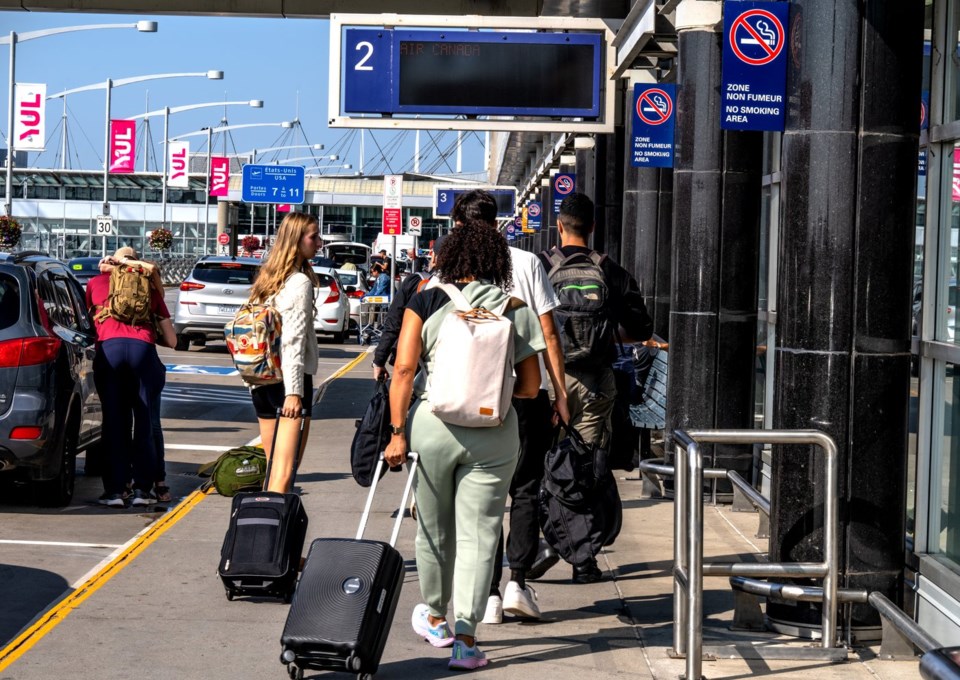TORONTO — Hannah Logan didn't expect to wind up in the hospital, or face a pricey bill for X-rays and medication when she travelled to Bosnia over a decade ago.
The Ottawa woman recalls staying in a "mouldy hostel" at the time, which led to her developing a lung infection and needing nine different types of antibiotics while abroad.
Despite the nightmarish situation, Logan said she was fortunate because she had planned ahead.
"Travel insurance came through for me," she said.
The 35-year-old self-described "digital nomad" now works as a travel blogger and influencer, leading group trips around the world — including an upcoming trek to Antarctica in January.
She said buying travel insurance isn't just a nice-to-have before a trip. It's a must.
"Yeah, it kind of sucks to throw out an extra $50, $100, whatever the coverage ends up being, but if you do need it, it can save you thousands," said Logan.
"And I just think for the peace of mind and knowing that's there just in case the worst does happen ... I think it's worth it."
Financial planners agree with that sentiment, adding it's important for consumers to shop around for a plan that best fits their individual needs when taking out travel insurance.
While most credit card companies provide some form of coverage for health or trip protection, personal finance and travel expert Barry Choi said he recommends taking out "extended" travel insurance on top of that.
He said extended coverage may offer protection for unforeseen circumstances such as trip cancellations and delays, lost baggage, or complications from natural disasters.
"Anything can happen these days," said Choi.
"We're seeing more flight delays. We saw what happened during the pandemic, even more recently hurricanes and how that affected travellers too."
While plans vary across providers, a full year of unlimited medical coverage for an individual traveller who is relatively healthy can cost less than $200, he said, while wider packages that include extra features like cancellation insurance might be closer to $350.
"I tell people, if you can't afford travel insurance, you can't afford to travel," said Choi.
"It's such a minimal cost, it's not worth it to not have it. I would rather not sleep in an airport, I would rather not have to panic or worry if my flight is cancelled and I don't have any compensation in place."
He said it's especially important for those over 55 years old to have a separate travel insurance policy in advance of a trip, as credit card coverage tends to reduce at that age in anticipation of increased medical issues.
Choi cautioned travellers should be aware of other factors that may arise which void coverage of certain costs. For instance, jetting off somewhere the Canadian government has formally advised to avoid due to the threat of a hurricane may mean you won't get reimbursed for the cost of changing your return flight.
"It really comes down to the fine print. You've really got to pay attention to your policies," said Choi.
John Lysack, a financial adviser and founder of Toronto-based John Lysack Wealth Management, said clients are more willing to take out extra travel insurance than they used to be.
He attributes the shift to the COVID-19 pandemic, when travel restrictions often complicated flight plans and the risk of getting sick on vacation meant potentially having to isolate in place before being allowed to board a plane.
"Since COVID happened, I think people are a lot more willing to get travel insurance, just because it's a real-life situation," said Lysack.
"People are starting to look into that a lot more as they realize that life happens and things can change very, very quickly."
Logan said she learned that lesson when COVID first hit in 2020. She said she was in a Middle Eastern desert when the Canadian government told citizens abroad to come home as borders began to close amid the unfolding public health crisis.
"I was panicking, trying to figure out, 'How do I get home?' The flights were so expensive," she recalled.
Logan learned from her insurance provider she would qualify for emergency evacuation coverage through her plan, which was specifically tailored for people like her who often work remotely outside their home country.
"My one-way flight ended up being almost $2,000, so I paid for the flight out of pocket, and I think that it was reimbursed in about 90 days," she said.
Lysack said that while younger clients are sometimes less appreciative of the value that insurance provides, it's simply not worth the risk to go somewhere without it.
"When it comes to your own life, if something happens abroad, those expenses can add up very, very quickly depending on the circumstance," he said.
This report by The Canadian Press was first published Nov. 7, 2024.
Sammy Hudes, The Canadian Press




